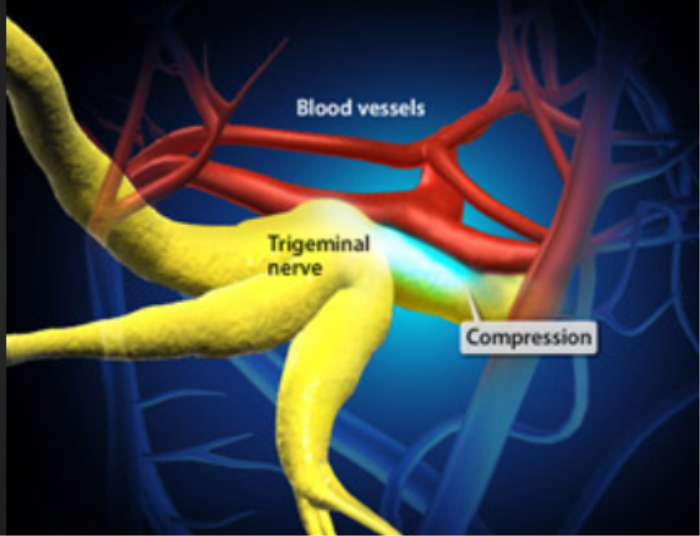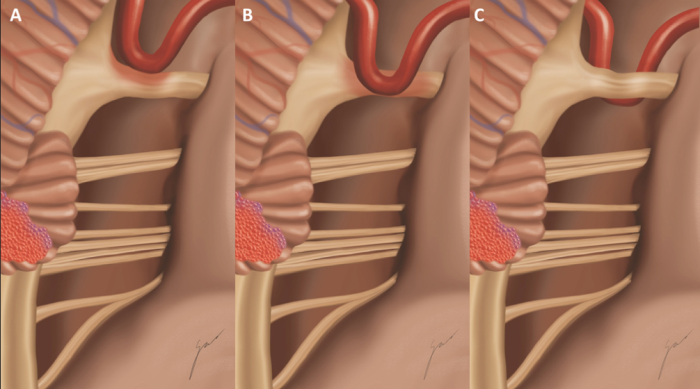Microvascular Decompression (MVD) surgery is a crucial procedure in India that addresses nerve pain caused by vascular compression on cranial nerves, particularly in patients with conditions like trigeminal neuralgia and hemifacial spasm. MVD surgery is often recommended when medications fail to provide relief, targeting the underlying issue of blood vessels pressing against nerves. Understanding the causes that lead to this surgery can help patients make informed decisions and recognize when it’s necessary to seek advanced medical care.
Understanding Microvascular Decompression (MVD) Surgery: An Overview
Microvascular Decompression (MVD) surgery is a delicate procedure aimed at relieving pressure on the cranial nerves caused by blood vessels, tumors, or vascular malformations. It is often performed when conservative treatments fail to relieve symptoms like severe pain or spasms caused by conditions such as trigeminal neuralgia or hemifacial spasm.
The Role of Blood Vessel Compression in Neurological Disorders
Blood vessel compression is a major cause of several neurological disorders, including trigeminal neuralgia and hemifacial spasm. When a blood vessel presses against a nerve, it can cause intense pain, muscle spasms, or other abnormal sensations, often leading to the need for MVD surgery.

Trigeminal Neuralgia: A Leading Cause for MVD Surgery
Trigeminal neuralgia is one of the most common conditions that necessitates Microvascular Decompression (MVD) surgery. This disorder, caused by the compression of the trigeminal nerve by blood vessels, leads to severe facial pain, and surgery is often the most effective treatment when medication fails.
Hemifacial Spasm and Its Relation to MVD Surgery
Hemifacial spasm is characterized by involuntary muscle contractions on one side of the face, typically caused by the compression of the facial nerve. MVD surgery is the most effective solution to relieve these spasms by decompressing the affected nerve.
Arterial Compression of Cranial Nerves: A Primary Factor in MVD
Arterial compression of the cranial nerves can lead to various neurological symptoms, such as pain and muscle spasms. This pressure is commonly seen in patients with conditions like trigeminal neuralgia and hemifacial spasm, where MVD surgery is often the recommended treatment.

Multiple Sclerosis: How it Can Lead to MVD Surgery
Multiple sclerosis (MS) may exacerbate or cause vascular compression of the cranial nerves, leading to symptoms like facial pain that mimic trigeminal neuralgia. When medication fails, MVD surgery is sometimes recommended to relieve the pressure and reduce pain.
Tumors and Lesions That Trigger the Need for MVD
Certain brain tumors or lesions can compress cranial nerves, leading to severe neurological symptoms. In such cases, Microvascular Decompression (MVD) surgery may be necessary to relieve the pressure and restore normal function.
Injury-Induced Nerve Compression and Its Surgical Implications
Traumatic injuries to the head or neck can result in nerve compression due to swelling or scarring. In such cases, persistent symptoms like pain or spasms may require MVD surgery to relieve the compression and improve nerve function.
Aneurysms in the Brain: A Cause for Microvascular Decompression
Aneurysms in the brain can sometimes press on cranial nerves, leading to debilitating symptoms. When this happens, MVD surgery may be performed to relieve the pressure and alleviate symptoms such as facial pain or spasms.
Abnormal Blood Vessel Anatomy: Its Role in Neurological Disorders
Some individuals have abnormal blood vessel anatomy that causes blood vessels to press against cranial nerves. This can result in conditions like trigeminal neuralgia, and Microvascular Decompression (MVD) surgery is often necessary to relieve the symptoms.
Recovery After Microvascular Decompression Surgery
Discover the typical recovery process following MVD surgery and steps to ensure a smooth rehabilitation.
Genetic Predisposition to Nerve Compression and MVD
Some patients have a genetic predisposition to developing vascular abnormalities that lead to nerve compression. When this results in conditions like trigeminal neuralgia or hemifacial spasm, MVD surgery may become necessary.
Chronic Pain Syndromes and MVD Surgery in India
Chronic pain syndromes caused by vascular compression of the cranial nerves, such as trigeminal neuralgia, often require MVD surgery when other treatments fail to provide relief. This surgery offers a permanent solution for many patients in India.
Refractory Cases of Trigeminal Neuralgia: When Surgery Becomes Necessary
When medications fail to control trigeminal neuralgia symptoms, these are called refractory cases. For such patients, Microvascular Decompression (MVD) surgery is often considered as the next step for lasting relief.
The Impact of Age on Vascular Compression Leading to MVD
As individuals age, changes in blood vessels may lead to nerve compression, increasing the risk of disorders like trigeminal neuralgia or hemifacial spasm. MVD surgery becomes more common in older patients to alleviate these symptoms.
Brain Tumors and Their Role in Requiring MVD Surgery
Brain tumors, especially those located near the cranial nerves, can exert pressure, leading to severe symptoms like facial pain or spasms. In such cases, Microvascular Decompression (MVD) surgery is a crucial procedure to relieve the compression caused by the tumor.
Facial Numbness and Pain as Indicators for MVD Surgery
Persistent facial numbness and pain, often due to nerve compression by blood vessels, can severely affect quality of life. When medications are ineffective, MVD surgery offers a permanent solution to alleviate these distressing symptoms.
Vascular Tortuosity and Its Link to MVD Surgery
Vascular tortuosity refers to the abnormal twisting of blood vessels, which can compress cranial nerves and cause pain. When this occurs, Microvascular Decompression (MVD) surgery may be required to correct the issue and provide relief.
Peripheral Nerve Damage Leading to MVD Surgery
In some cases, peripheral nerve damage caused by injury or illness can mimic conditions like trigeminal neuralgia. If nerve compression is identified, MVD surgery can help relieve symptoms and restore normal function.
Hypertension's Role in Nerve Compression and MVD
Chronic hypertension can lead to changes in blood vessels, increasing the risk of vascular compression on cranial nerves. In such cases, when nerve damage is caused, MVD surgery becomes a necessary treatment option.
Best Microvascular Decompression (MVD) Treatment in India
The Best MVD Treatment in India is performed by expert neurosurgeons who use advanced techniques to relieve nerve compression, providing a customized treatment plan to ensure optimal patient outcomes.
Best Microvascular Decompression (MVD) Hospitals in India
The Best MVD Hospitals in India are equipped with state-of-the-art technology, offering comprehensive care from diagnosis to post-surgical recovery for conditions like trigeminal neuralgia and hemifacial spasm.
Microvascular Decompression (MVD) Surgery Cost in India
When considering the MVD Surgery Cost in India, patients benefit from transparent pricing and cost-effective treatment options at leading hospitals, without compromising on the quality of care.
Best Microvascular Decompression (MVD) Doctors in India
The Best MVD Doctors in India are highly skilled in performing this delicate surgery, ensuring precise techniques and a patient-centered approach for optimal recovery and long-term relief.
Cervical Disc Herniation and Its Impact on Nerves
Cervical disc herniation can result in nerve compression that mimics cranial nerve issues. For patients experiencing severe pain and muscle spasms, MVD surgery can help to relieve pressure on the nerves and improve overall function.
Vascular Loops in the Brain: A Cause for MVD Surgery
Vascular loops in the brain occur when blood vessels wrap around cranial nerves, leading to compression and symptoms like pain or muscle spasms. Microvascular Decompression (MVD) surgery is often required to correct this condition.
Brainstem Abnormalities and Their Connection to MVD Surgery
Brainstem abnormalities can cause cranial nerve compression, leading to painful conditions such as trigeminal neuralgia. When other treatments fail, MVD surgery offers a safe and effective method to relieve this compression.
Recurrent Trigeminal Neuralgia and the Role of MVD
For patients who experience recurrent trigeminal neuralgia after initial treatment, MVD surgery offers a long-term solution by permanently addressing the root cause, which is often vascular compression.
Cystic Compression of Nerves Leading to MVD Surgery
When cysts develop in close proximity to cranial nerves, they can cause compression, leading to pain and dysfunction. Microvascular Decompression (MVD) surgery may be necessary to remove or reposition the cyst and relieve the pressure.
Persistent Muscle Spasms as an Indication for MVD
Persistent muscle spasms, particularly in the face, are a common symptom of cranial nerve compression. When these spasms do not respond to medication, MVD surgery is often the best option for relief.
The Risk of Nerve Damage Without MVD Surgery
Without intervention, conditions like trigeminal neuralgia or hemifacial spasm can lead to permanent nerve damage. MVD surgery is essential in preventing this damage and preserving nerve function.
Brain Inflammation and Its Impact on Nerve Compression
Severe brain inflammation can lead to increased pressure on the cranial nerves, resulting in pain and dysfunction. MVD surgery is sometimes required to alleviate this pressure and restore normal neurological function.
Chronic Neck Pain as a Contributor to MVD Surgery
For patients experiencing chronic neck pain due to nerve compression, Microvascular Decompression (MVD) surgery can provide relief by decompressing the affected nerve and alleviating pain.
Spinal Conditions That Lead to Cranial Nerve Compression
Certain spinal conditions, like herniated discs or bone spurs, can affect the alignment of blood vessels, leading to cranial nerve compression. In such cases, MVD surgery may be the necessary treatment to relieve the pressure and restore function.
Frequently Asked Questions (FAQs)
What is Microvascular Decompression (MVD) surgery?
Microvascular Decompression (MVD) surgery is a procedure used to relieve nerve compression caused by blood vessels or tumors, leading to conditions like trigeminal neuralgia or hemifacial spasm.
Why is MVD surgery needed?
MVD surgery is necessary when vascular compression of cranial nerves causes severe pain or spasms that cannot be managed with medication.
How does vascular compression cause neurological symptoms?
Vascular compression leads to nerve irritation, causing abnormal signals to be sent to the brain, which results in conditions like trigeminal neuralgia or hemifacial spasm.
What conditions can lead to the need for MVD surgery?
Conditions like trigeminal neuralgia, hemifacial spasm, tumors, aneurysms, and vascular malformations can lead to the need for MVD surgery.
What are the risks of MVD surgery?
The risks of MVD surgery include infection, nerve damage, and fluid leaks, though these are rare, making it a generally safe procedure.
Is MVD surgery permanent?
Yes, most patients experience long-term relief from symptoms after MVD surgery, though rare cases of recurrence may occur.
How long is the recovery period after MVD surgery?
The recovery period after MVD surgery typically lasts a few weeks, during which patients may experience some pain or discomfort.
What are the long-term results of MVD surgery?
The long-term results of MVD surgery are generally excellent, with most patients experiencing permanent relief from pain or spasms, though some may require additional treatments.
How safe is MVD surgery in India?
MVD surgery in India is considered very safe when performed by experienced neurosurgeons in top hospitals. Advanced technology and medical expertise ensure high success rates.
How do I prepare for MVD surgery?
Preparing for MVD surgery involves following your doctor’s guidelines, which may include pre-surgery tests, stopping certain medications, and arranging for post-operative care.
Are there non-surgical alternatives to MVD surgery?
While medications and less invasive procedures can manage symptoms of nerve compression, MVD surgery is often the only long-term solution for severe cases.
How long does MVD surgery take?
MVD surgery typically takes 2 to 3 hours, depending on the complexity of the case and the extent of nerve compression.